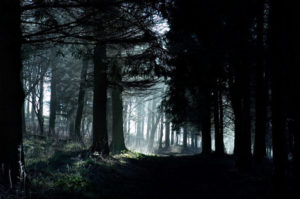Dark Is The Stain: Chiaroscuro
Delving into Darkness
Welcome to the new series! Church brat points to whoever knows which song “Dark is the Stain” comes from.
I decided, in honor of the season, to go with a dark speculation of story. As Brian Godawa’s series has suggested, the “dark genres” often play out by way of confronting human nature, good & evil, and basic human carnality and fears (which, btw, is an excellent series). That’s using darkness to underscore the light, a pitch black background to highlight the brilliance of a sun.
But, first, I want to use the idea of chiaroscuro, which is a sharp contrast between dark and light tones (in art). This can apply to visual light and shadows, mood, or character. What I’m suggesting today is that sometimes it’s light that underscores darkness: That brilliant sun becomes the background that unmasks the tiniest speck of black paint.
The idea actually hit me while I was watching the finale of season one of Merlin.
(SPOILER WARNING!)
Here you have this teenage boy with powers no one really knows the scope of and a nature that’s generally amiable and mild-tempered. Yeah, he’s got the spine to tell off the crown prince, but he’s also got the wits to not push beyond what’s acceptable. Merlin’s version of malicious, for the most part, consists of a teenage prank at worst.
But the end of season one contains a showdown between a sorceress and Merlin. Merlin’s rushed off to save Arthur, and he fully intends to sacrifice himself. But what he didn’t anticipate was a friend’s interference and the sorceress agreeing to take the friend’s life instead. He arrives to find the sorceress standing over the fallen friend. The two fight, until finally she lands a blow that knocks him flat.
Merlin quietly stands up, much to Nimueh’s horror, with a strange look in his eyes. In an even tone, he says, “You shouldn’t have killed my friend.” Then he raises his hand and conjures a storm. Lightning strikes the sorceress dead and rain pours down. Then the look leaves Merlin’s face and he runs to his friend’s side.
(END SPOILER)
 The reason it hit me is this: For the first time, we get a real glimpse of what Merlin’s capable of, the warlock legend remembers. But had Merlin been a boy given to shows of strength or flashes of dark rage, this brief glimpse of who and what Merlin really is –what he’ll be–wouldn’t have been nearly as powerful. In this instance, it’s the lightheartedness of Merlin that underscores his darker mood, however brief. His usual gentleness makes his revenge swift and terrible.
The reason it hit me is this: For the first time, we get a real glimpse of what Merlin’s capable of, the warlock legend remembers. But had Merlin been a boy given to shows of strength or flashes of dark rage, this brief glimpse of who and what Merlin really is –what he’ll be–wouldn’t have been nearly as powerful. In this instance, it’s the lightheartedness of Merlin that underscores his darker mood, however brief. His usual gentleness makes his revenge swift and terrible.
Another example came to me by way of my friend Jeremy, who mentioned a character from the Dresden Files named Ebenezer McCoy. He said, “Imagine Santa Claus–a genuinely jolly Santa Claus–who is a member of the White Council (the good guys), but who secretly serves as their “blackstaff,” a wizard who is not bound by wizarding rules or a concept of right and wrong. Though he is one of the most compassionate characters on the council, he is sometimes forced to commit atrocious acts against their enemies, because he’s the only one who can.”
Then there’s Dar, from Donita Paul’s books. If you’re familiar with the DragonKeeper books at all, you love Dar, the charming negotiator who does everything with a smile on his face . . . until you see him fight. The witty, entertaining servant of Paladin suddenly turns into a decorated war hero (who’d never admit that in public or private) who commands Paladin’s warriors.
Fourthly, I present Walter from Bryan Davis’ series. He plays comic relief more often than not, but if you back him into a corner, especially in Song of the Ovulum, he turns into a hardcore fighter no man in his right mind toys with.
Light reveals the dark.
Push Back the Darkness
I’ve heard a saying more than once in writing circles that evil must be painted with the blackest brush to make the light stand out — and I’m not saying that’s wrong. To be sure, we writers face darkness and evil and put them on open display so that our readers may view the spectacle from a safe distance.
 But the draw of something like Merlin or DragonKeeper is that they don’t need intense violence, angsty teenagers, black moods, foul spirits, or an abundance of vice to make their good guys look good. Part of the Merlin draw is that the good guys are not a united force yet, so most of the time they’re getting in each other’s way unwittingly while trying to solve the same problem from the perspective that most makes sense to them. Instead of a dark, brooding story of the events leading to Merlin and Arthur’s reign or a whimsical, silly tale that spoofs the Arthur legends, the show rather takes an even-tempered approach: balancing an overall light tone with the sober reality of the dark forces of magic that continue to lay siege to Uther’s reign as payback for what he’s done to everyone who’s ever used the art.
But the draw of something like Merlin or DragonKeeper is that they don’t need intense violence, angsty teenagers, black moods, foul spirits, or an abundance of vice to make their good guys look good. Part of the Merlin draw is that the good guys are not a united force yet, so most of the time they’re getting in each other’s way unwittingly while trying to solve the same problem from the perspective that most makes sense to them. Instead of a dark, brooding story of the events leading to Merlin and Arthur’s reign or a whimsical, silly tale that spoofs the Arthur legends, the show rather takes an even-tempered approach: balancing an overall light tone with the sober reality of the dark forces of magic that continue to lay siege to Uther’s reign as payback for what he’s done to everyone who’s ever used the art.
“He reveals mysteries from the darkness and brings the deep darkness into light.”
~Job 12:22









































Hey, another good example of this is the Doctor… XD (Nope, not worked out of my system yet)
Oohhhh, Merlin gets better? I watched seven episodes and got bored. Can I skip to the end of the season?
I generally quite enjoy the juxtaposition of light and dark. Particularly as in Doctor Who. Hehe.
Merlin’s much more episodic, but it’s fun. You probably could, I suppose. The last two go together. But you’re almost *at* the end of the season, if you watched seven of them.
I like DW, but Merlin better demonstrated the “light” side of things, at least to me. You’re right; DW does do that. But in this instance I just went with Merlin because it’s lighter on the whole.
The shows I watch tend to be a bit dark, so turning on Merlin helps me out. But yeah, Merlin gets better. Season two is better than season one, I think. They worked more with character development this round. (And tried really hard to make me pity Uther. They did try hard.)
I got bored for a couple of reasons:
(1) Okay, I was really disappointed that Merlin uses spells. I thought he was going to be different, the one kid who had natural magic while everyone else forced it. I called him Jedi-Merlin and it was a lot of fun. Until the end of episode 1.
(2) the formula of each episode. Magical thing attacks in some way. Merlin saves them. Without revealing himself.
But it was fun, the antics of the characters. It just didn’t last. 😛 (Not like DW. XD)
I think it depends on which episode you watch of DW. Series 5, for example, is tons lighter than series 4 or 6. (And series 5 happens to be the one that I always refer back to because it’s my favorite. XD) Rather than Merlin which seems to be light all the time. (It’s not even that serious when people are going to die because we know they won’t…)
(1) Okay, I was really disappointed that Merlin uses spells. I thought he was going to be different, the one kid who had natural magic while everyone else forced it. I called him Jedi-Merlin and it was a lot of fun. Until the end of episode 1.
I thought that was interesting too, because he’s supposed to be powerful enough to not need them. I’m curious to see how that plays out. I expected that to stop after the finale of season one. From what I can tell, the spells are more like ‘training wheels.’ He can’t control it yet, and he really should be using the spells less over time. But I really think Gaius is holding him back in many respects. Either that or the writers realized there’d never be a chance of him getting caught if he never had to speak the spell. It’s getting harder. I half thing Arthur has to legitimately be suspicious and simply deciding not to confirm it (cuz then he’d have to do something about it).
(2) the formula of each episode. Magical thing attacks in some way. Merlin saves them. Without revealing himself.
Haha. I’ll admit I’m ready for them to change it up sometimes. It works out better when they start focusing on other characters for a bit. Arthur really starts to own in season two. I really like him now.
But it was fun, the antics of the characters. It just didn’t last. (Not like DW. XD)
In all fairness, it took me awhile to warm up to DW.
I think it depends on which episode you watch of DW. Series 5, for example, is tons lighter than series 4 or 6. (And series 5 happens to be the one that I always refer back to because it’s my favorite. XD)
I agree on DW. But like I said, I chose to use Merlin because it’s mostly lighter.
Rather than Merlin which seems to be light all the time. (It’s not even that serious when people are going to die because we know they won’t…)
Haha. You have no idea, my friend. 0=) Get to season two.
In all fairness, I can make that charge against 99% of what I read or watch. The trick is in how they survive.
Again, that’s why I picked Merlin: The darkness (siege warfare, dark magic, nasty rituals, doomed characters) is never dismissed, but it’s never dwelt on too much. It’s there, but they don’t hammer me with it. After DW, Criminal Minds, and a plethora of dark-themed whodunit shows, I’m ready for something less psychologically taxing.
Really, it’s part of what I call a necessary purge phase. As a writer, after I write something dark, I have to go purge – there’s a variety of ways to do it, but I have to purge the poison I’ve taken in. Same as a reader/viewer. After the finale of DW and a rather dark Criminal Minds episode, I was ready for something less taxing. Merlin does it for me. (I”d go for a book, but I’m not sure I own that many.)
My first introduction to the term “Chiaroscuro” was in Kate DiCamello’s novel “The Tale of Despeaurux, where it’s the name of a rat.
Jenni and Kaci, I love how we tie in Doctor Who to almost everything. And the fifth season is my favorite too. The Doctor has a lot of chiaroscuroic moments…the Family of Blood comes to mind.
Great post, Kaci. I love this idea of showing light in such a way that it sets off the dark. It’s the inverse of what many people say, but I think it mirrors spiritual reality. It’s when we see God’s love and Christ’s sacrifice that we realize our own righteousness is filthy stuff, not good at all. The light illuminates and it also contrasts. Good, good thoughts.
Becky
(Anyone know what happened to our comments? On my browser everything looks like it’s in Bold font. Very annoying.)
Maybe someone edited his/her comment by now to close a previously unclosed boldface tag? From this end, everything looks okay (in Firefox, Google Chrome, and IE, anyway).
Apparently not. The creeping bold was affecting the front page also. Found it. Fixed it.
My first introduction to the term “Chiaroscuro” was in Kate DiCamello’s novel “The Tale of Despeaurux, where it’s the name of a rat.
haha. A friend introduced it to me. I loved the idea.
Great post, Kaci. I love this idea of showing light in such a way that it sets off the dark. It’s the inverse of what many people say, but I think it mirrors spiritual reality. It’s when we see God’s love and Christ’s sacrifice that we realize our own righteousness is filthy stuff, not good at all. The light illuminates and it also contrasts. Good, good thoughts.
I just got to thinking, after awhile, too much darkness and even the speck of light seems dark. After awhile dark humor is just dark humor – it can only push back the darkness for so long. It’s a shade of gray in the middle of the blackness. But pure, unadulterated light exposes the tiniest thing that crosses its path.
To quote a different incarnation of Merlin: “For every high there is a low, for every to there is a fro…”
Not a lot of chiaroscuro going on in that version, but I thought the idea of Merlin winning a wizard’s duel by becoming a contagious bacterium was genius.